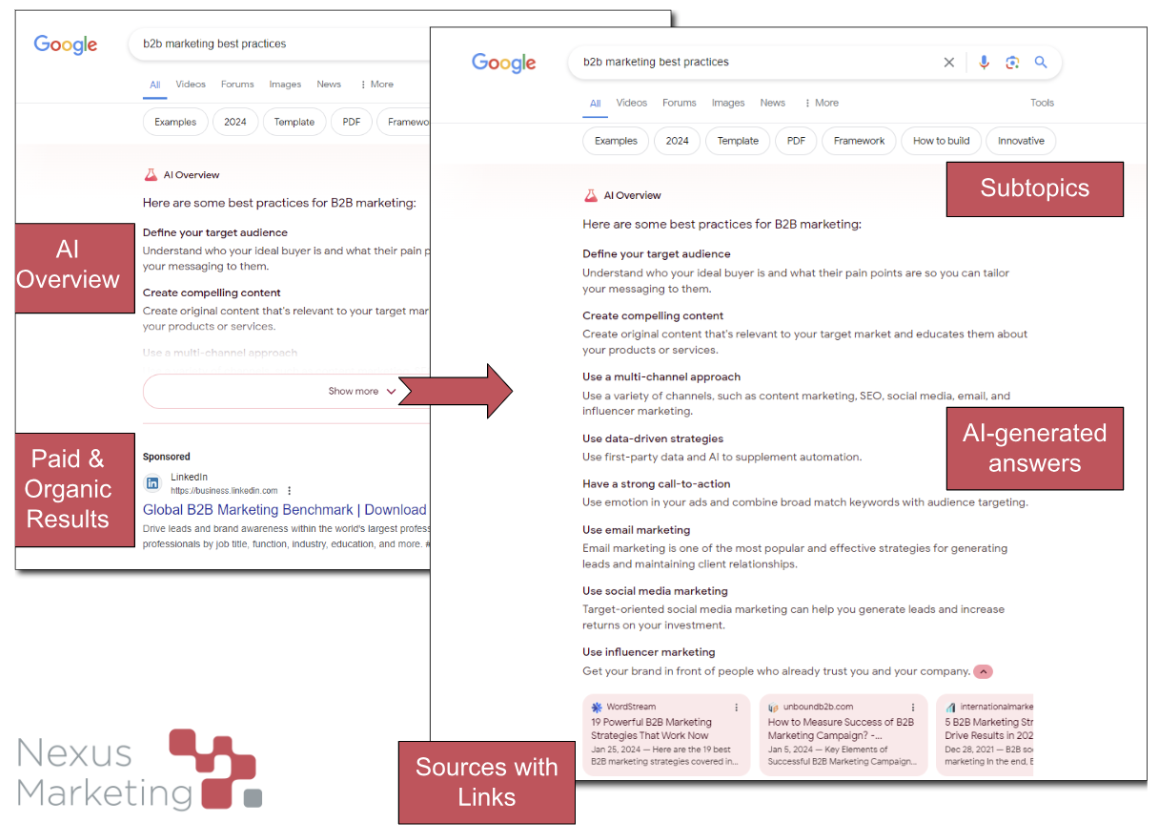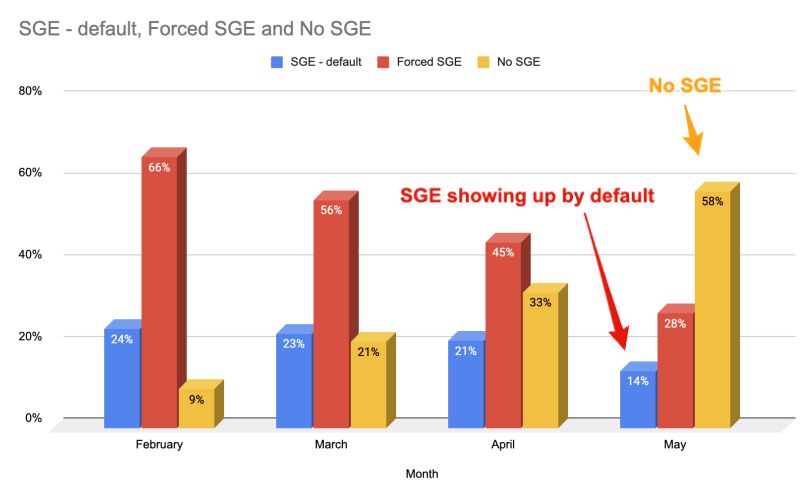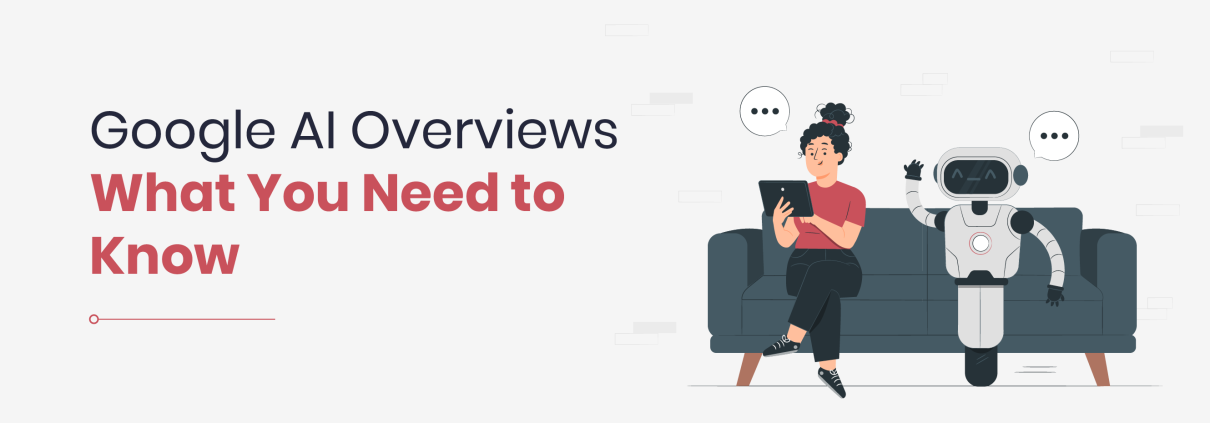Google AI Overviews: What You Need to Know
The big day’s finally here—Google recently announced that AI overviews (previously known as Search Generative Experiences or SGEs) will be broadly rolled out to the public after months of testing with small audience segments.
The SEO world has been buzzing and speculating about the impact of Google’s new AI features for a while now. There’s been a lot of excitement but just as much fear and anxiety. What do these changes mean for organic SEO? Will domains that currently rank highly see increased or decreased engagement? Will Google cite the sources that it uses in AI answers?
We put together this quick guide to help you understand what these AI results are and how they may impact SEO going forward:
- What are AI Overview results?
- How will AI Overviews impact organic SEO?
- How are we adapting our approach?
What are AI Overview Results?
If you haven’t yet seen one of these AI results, here’s a quick overview:

In this SERP for the query “B2B marketing best practices,” Google serves an AI overview at the top of the page. Under it, we see the normal paid and organic search results.
Click the “Show more” button, and Google expands the AI overview to show the full AI-generated response, including suggested subtopics, the full list of marketing best practices, and citations of the pages used to generate this information (plus links to them).
What kinds of search terms do AI Overviews appear for?
Google has explicitly stated that “AI Overviews appear in Google Search results when our systems determine… you want to quickly understand information from a range of sources, including information from across the web and Google’s Knowledge Graph.”
In other words, AI Overviews will appear most frequently for educational and task-based top-funnel queries. Google wants to provide quick answers, suggestions, and sources, essentially guiding users through the first stages of their search or purchase journeys. Here’s an example for the query, “How do you clean a fabric sofa”:

Google also appears to be taking a careful approach to rolling out these changes so far. As of May 2024:

- Only 14% of queries return AI results automatically
- 28% of queries return AI Overviews when manually prompted (forced)
- 58% of Google queries have no AI results enabled (up from 9% in February)
We’ll definitely see these numbers evolve over time as the system is refined and improved, but remember that AI Overviews are not a drastic overnight change.
More context to keep in mind:
AI Overviews will impact paid Google Ads just like organic results. Ads are a massive revenue source for Google, so we can definitely expect more changes to the AI Overview system in the future for this reason alone—nothing’s set in stone!
Why AI Overviews are exciting
The Google Search experience is rapidly evolving to keep up with changing technology and user habits and preferences—it’s just plain cool.
We also expect AI Overviews to spur a lot of beneficial experimentation and improvement in how web content is created. At Nexus, this has been a huge topic of discussion since the rapid rise of ChatGPT, and we’ve been actively evolving, experimenting, and improving our content practices for a long time now. It’s an exciting time! (Skip ahead to learn more about the strategies on our mind these days.)
For your website, AI Overviews may create opportunities to gain increased visibility and clicks if pages don’t yet rank highly in organic results. This is because the AI-generated content does not necessarily draw from the top-ranking organic content (although it often does).
AI Overviews also appear to favor trusted domains that discuss topics related to the query (just like the normal organic ranking process). This means your excellent website full of optimized content should stay highly visible in this new format.
Why some are worried
AI Overviews represent a huge change for Google, so many in the field are worried about the impacts it will have on their SEO. It all boils down to the fact that for many types of queries, the AI experience shifts the focus partly away from organic results.
This anxiety is nothing new, though. Every new algorithm change and interface update that Google rolls out has been received with dramatic cries of “SEO is dead!” for decades now—usually amplified by panicked websites that use spammy strategies to game the system at scale. This is why Google’s anti-spam updates in March 2024 were met with such drama.
SEO is definitely changing (and has been steadily for years), but as long as people use search engines to find the information, products, and services they need, SEO will still be a crucial tool for reaching them.
The biggest lesson we’ve learned from years of Google algorithm changes and policy updates: Pay attention, learn, and adapt, and you’ll be fine.
Let’s take a closer look at specific SEO impacts that many are expecting as a result of AI Overviews:
Potential SEO Impacts of AI Overviews
The major potential SEO impacts of Google’s AI Overviews can be summed up like this:
- AI Overviews disrupt the normal pattern of ads and organic results appearing at the top of results pages, potentially decreasing visibility.
- This decreased visibility may lead to reduced clickthrough rates (CTR) for pages that previously appeared at the top of results pages.
- Decreased CTRs may translate to lower traffic, meaning fewer users and leads engaging with the content.
In tactical terms, here’s what we’ve also learned so far:
- Google claims that “the links included in AI Overviews get more clicks than if the page had appeared as a traditional web listing for that query.”
- This claim has been widely disputed by SEO professionals, but we’re still in very early days.
- It’s important to remember that the actual CTR impacts are incredibly specific to the query and the user’s intent. We’ve seen similar concerns around Google’s Featured Snippet features (functionally a precursor to AI Overviews): In some cases, they dramatically decrease CTRs of lower-ranked content, and in others the effect is minimal. It all depends on the full context of the search.
- Google will provide impression and click data for pages cited in AI Overviews in Search Console reports.
- However, it will lumped together with the rest of the organic engagement data, not tracked separately.
- We can likely expect more developments on this front in the coming months, and SEO reporting practices will evolve to keep up.
Does it matter? Big-picture analysis of the SEO impacts of AI Overviews
Will AI Overviews decrease clickthrough rates?
Yes, CTRs for content appearing for educational, top-funnel search terms will likely generally decrease, leading to less overall traffic to those pages.
Does this matter?
For most websites, not really. (Unless the primary purpose of your website is to generate ad revenue—which is why spammy websites get so upset about algorithm changes.)
Raw traffic is not a particularly valuable SEO performance metric for most brands’ websites. Even less so when it arrives through top-funnel content.
Why?
The goal of a brand’s website is to generate qualified leads. Broad search terms that generate a lot of traffic aren’t good at this. They instead build your awareness and visibility, funneling a tiny segment of visitors towards converting. Most visitors, if they’re actual potential leads, will engage with other parts of your website, sign up for emails, download a resource, or simply return at a later date to learn more.
Remember the old B2B marketing “Rule of 7” — it takes, on average, 7 interactions with your brand before a lead is ready to convert. If anything, today’s internet has made the average journey even longer. Accenture found that most buyers are already 57% through the buying process before they’re ready to engage with a sales representative.
The entire journey before that point matters. AI can handle the very first stages of the sales funnel, then you should put your energy into what matters more: Attracting and engaging more qualified audiences.
What does this mean practically speaking?
Full-funnel content strategies are increasingly important. This means:
- Producing and maintaining high-quality content to ensure visibility and awareness across search results (including in AI Overviews).
- Putting a greater emphasis on your middle- and bottom-funnel content strategies. Create unique content that truly answers their questions and addresses their concerns.
- Remember, these are the audiences you want, and the terms they’re searching are less likely to generate AI results.
- Building multiple engagement options into your website—email, video, downloadable resources, and more—to retain the attention of qualified audiences.
- Increasing your brand’s visibility in other ways, like public thought leadership opportunities and cross-blogging.
TLDR: Brands that prioritize raw traffic above engagement from qualified audiences are likely to be hit hard by the AI evolution.
Brands with holistic, focused content strategies are not likely to be heavily impacted.
If you already follow SEO best practices and have a thoughtful conversion strategy, you’re already winning.
How is Nexus Adapting to AI Overviews?
The Nexus content team has been talking about AI Overviews (or SGEs as they were previously called) for months now.
Our standard content practices already set us up well to compete on any search results page—your Nexus-created content is already leading the way.
But with the widespread rollout of AI Overviews, a few points in particular are on our radar. We’re specifically prioritizing:
- A deeper understanding of the user intent, funnel position, and how to best address them in the content.
- If you’re a Nexus client and have helpful sales collateral or customer interviews, please share them with us!
- An increased emphasis on organic “topics” rather than just straightforward keywords.
- AI systems understand language more naturally, looking for concepts and related phrases instead of just discrete keywords.
- Longtail “How do I…” and “Why should I…” queries are also more likely to receive AI Overview results—we’ll make sure you show up for them!
- Writing more directly and concisely than ever.
- This will ensure we’re providing the quick answers that both users and Google want.
- Creating true “information gain”—content that AI can’t replicate.
- Look for more statistics, trends, and case studies featured in your content.
- Your copywriter might even reach out to you for some direct stories and opinions. Google loves content that takes a specific position!
In addition to beefing up our content strategies, the Nexus team has also been improving and developing a full range of other service options that can help your brand build its overall awareness and authority. These include influencer marketing, video production, public thought leadership opportunities through NXUnite, and more.
Please contact us to learn more about any of these services or to chat about your brand’s overall digital marketing strategy.
Key takeaways from this article
- As long as people use search engines to find the information, products, and services they need, SEO will still be a crucial tool for reaching them.
- Google algorithms and processes have always changed. Pay attention, learn, and adapt, and you’ll be fine.
- Remember the most important goals of your website: leads, not traffic.
- If you already follow SEO best practices and have a thoughtful full-funnel conversion strategy, you’re already winning.
And if you’re already a Nexus client, we’ve got you covered. We think about Google’s changes and how to stand out in a changing online world all day. Please don’t hesitate to get in touch if you want to learn more.
Have any questions or want to learn more about how we’re thinking about AI changes in the search landscape?
Contact us or reach out directly to your Nexus points of contact at any time.
Sources and Additional Resources
- Search Engine Land: Google rolls out AI Overviews in US with more countries coming soon
- Search Engine Journal: Google Rolls Out AI-Powered Overviews To US Search Results
- Search Engine Journal: Google’s AI Overviews Documentation: Key SEO Insights
- Semrush: What Is the Future of SEO in 2024? 9 Critical SEO Trends to Know




